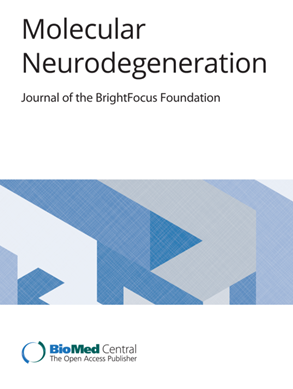肌萎缩侧索硬化症中的甘油磷脂:疾病机制和临床意义的见解
IF 17.5
1区 医学
Q1 NEUROSCIENCES
引用次数: 0
摘要
肌萎缩性侧索硬化症(ALS)是一种影响成人运动系统的毁灭性神经退行性疾病,目前尚无有效的治疗方法。尽管进行了广泛的研究,但导致进行性运动神经元变性的确切病理级联仍然难以捉摸。最近的证据强调了在ALS进展过程中脂质代谢的显著改变,甚至在运动症状出现之前。甘油磷脂是细胞膜的主要成分,在ALS患者和模型中经常发生改变。这些脂质不仅在细胞膜中起结构作用,而且还参与细胞代谢、信号通路和细胞类型特异性过程,如神经元传递和肌肉收缩。在这篇综述中,我们讨论了甘油磷脂在运动系统中的生理功能,并回顾了最近的研究表明它们的改变和ALS可能的潜在病理机制。此外,我们讨论了研究神经变性中脂质改变所带来的挑战,并评估了甘油磷脂的治疗潜力。本文章由计算机程序翻译,如有差异,请以英文原文为准。
Glycerophospholipids in ALS: insights into disease mechanisms and clinical implication
Amyotrophic lateral sclerosis (ALS) is a devastating neurodegenerative disease affecting the adult motor system, with no effective treatments available. Despite extensive research efforts, the exact pathological cascade leading to progressive motor neuron degeneration remains elusive. Recent evidence highlights significant modifications in lipid metabolism during ALS progression, even before the onset of motor symptoms. Glycerophospholipids, the primary components of cellular membranes, are frequently altered in ALS patients and models. These lipids not only play a structural role in membranes, but also contribute to cellular metabolism, signaling pathways, and cell type-specific processes such as neuronal transmission and muscle contraction. In this review, we discuss glycerophospholipid physiological functions in the motor system and review recent studies demonstrating their alterations and the possible underlying pathological mechanisms in ALS. Furthermore, we discuss challenges emerging from studying lipid alterations in neurodegeneration and evaluate the therapeutic potential of glycerophospholipids.
求助全文
通过发布文献求助,成功后即可免费获取论文全文。
去求助
来源期刊

Molecular Neurodegeneration
医学-神经科学
CiteScore
23.00
自引率
4.60%
发文量
78
审稿时长
6-12 weeks
期刊介绍:
Molecular Neurodegeneration, an open-access, peer-reviewed journal, comprehensively covers neurodegeneration research at the molecular and cellular levels.
Neurodegenerative diseases, such as Alzheimer's, Parkinson's, Huntington's, and prion diseases, fall under its purview. These disorders, often linked to advanced aging and characterized by varying degrees of dementia, pose a significant public health concern with the growing aging population. Recent strides in understanding the molecular and cellular mechanisms of these neurodegenerative disorders offer valuable insights into their pathogenesis.
 求助内容:
求助内容: 应助结果提醒方式:
应助结果提醒方式:


